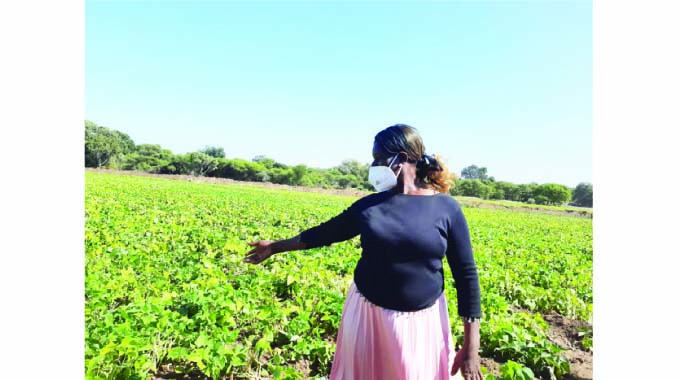2 000 youths to benefit from irrigation project

Yoliswa Dube-Moyo, Matabeleland South Bureau Chief
ABOUT 2 000 youths in Matabeleland South province are set to benefit from the Smallholder Irrigation Revitalisation Programme (SIRP).
Through the Agriculture and Food Systems Transformation Strategy, Government seeks to develop a robust agriculture sector proficient in turning around and steering Matabeleland South towards Vision 2030 by providing strategic responses to the increasing population.

Deputy Minister Vangelis Haritatos has a feel of some of the grain harvested by farmers at Sebasa Irrigation Scheme while Matabeleland South Provincial Affairs and Devolution Minister Abednico Ncube looks on
It also seeks to address low agriculture production and productivity, climate change and low inflow of investment into the province’s agriculture.
Deputy Minister of Lands, Agriculture, Fisheries, Water and Rural Development Vangelis Haritatos said projects that include the provision of necessities to both vulnerable and smallholder farmers, fostering market linkages and climate proofing all agriculture support programmes were Government’s top priority for Matabeleland South.
“The implementation of market-based programmes meant to improve competitiveness of agriculture commodities on the domestic and international markets are also a priority.
President Mnangagwa is on record saying the Second Republic will not leave anyone behind as it moves towards the attainment of Vision 2030. In this regard,
“SIRP is promoting social inclusion of previously marginalised groups such as youths, people with disabilities and women in agriculture.

Deputy Minister of Lands, Agriculture, Fisheries, Water and Rural Development Vangelis Haritatos
A total of 2 000 youths will benefit from the programme while women are expected to constitute 50 percent of the beneficiaries,” said Deputy Minister Haritatos.
He said in order to address the effects of hidden hunger caused by the lack of nutrients such as iron, zinc and vitamins, SIRP is actively promoting the adoption of bio-fortified seeds.
“Government is aware of the challenges faced by farmers with regards to production and productivity, scheme sustainability and access to markets.

Grain
While Government encourages farmers to grow grain which contributes to the national strategic grain reserves, I encourage you to also rotate cultivation of grain with high value crops such as groundnuts, pepper, potatoes, spices, vegetables and fruits,” said Deputy Minister Haritatos.
SIRP is a US$52 million programme established in 2016 to reduce the vulnerability of smallholder farmers to food and nutrition insecurity, climate change effects and economic shocks as well as contribute to the resilience of smallholder farming communities.
The programme is expected to revitalise 60 irrigation schemes covering 6 100 hectares in Manicaland, Masvingo, Matabeleland South and Midlands provinces.
It targets more than 27 500 rural households where 15 000 households are irrigators and 12 500 households are in the adjacent rain-fed areas.
In Matabeleland South province, nine schemes in Gwanda, Mangwe, Beitbridge and Insiza will be rehabilitated under the SIRP programme. — @Yolisswa










Comments